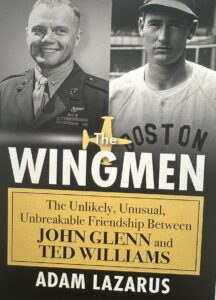Paul O’Connor, intrepid journalist and discerning reader, reviews a new book about the long-lasting friendship between two very different American heroes.
Reviewed by Paul T. O’Connor
THE WINGMEN: The Unlikely, Unusual, Unbreakable Friendship Between John Glenn and Ted Williams. By Adam Lazarus. The Citadel Press. 232 pages. $29, hardcover.
There’s no explaining friendships.
 Often, people with seemingly little in common and much in contrast can be the best of friends. It’s like the old saw that “opposites attract,” when we would think that they more often repulse. Usually, there’s one important thing that two otherwise opposites have in common that creates a bond so strong that the friends can overlook their differences.
Often, people with seemingly little in common and much in contrast can be the best of friends. It’s like the old saw that “opposites attract,” when we would think that they more often repulse. Usually, there’s one important thing that two otherwise opposites have in common that creates a bond so strong that the friends can overlook their differences.
One such friendship began in 1953, and it is the topic of Adam Lazarus’ new book, The Wingmen. Ted Williams, one of the best-known baseball players of the time and a future Hall of Fame inductee, and John Glenn, a rising star in U.S. Marine Corps aviation and the first American to orbit the earth, were assigned to the same U.S. Marine air station during the Korean War. No one put them together on purpose, but, for at least eight combat missions, Williams flew as Glenn’s wingman. (Each also flew alongside other pilots but considered this pairing as their most important.)
The bonds they formed lasted a lifetime, and they meant more to each other than the personal, social and political differences that one might have expected to pull them apart.
They could hardly have been more dissimilar. Glenn was determined to be a Marine lifer while Williams resented being recalled for duty – he’d already served in World War II, as had Glenn – and he expressed his wish to be discharged. Glenn was quiet, soft-spoken and devout. Williams was profane, loud and a non-believer. Glenn married his high school sweetheart; Williams divorced three times, mostly because of his infidelities. Glenn was a Democrat, eventually a U.S. senator and an unsuccessful presidential candidate; Williams was a diehard Republican, good friend of Richard Nixon and a loyal advocate for GOP presidential candidates.
In Korea, the two went through harrowing experiences together, and Williams always said that Glenn had saved his life during one mission when he had calmly guided Williams’ burning jet into a higher altitude and thinner air to extinguish the flames and then escorted him back to base.
The two kept in touch through their nearly 50-year postwar friendship and saw each other many times. Glenn attended several of the baseball tributes for Williams, and Williams was there in 1998 to watch as Glenn returned to space aboard the shuttle Discovery.
Lazarus is a veteran sportswriter with two other books and numerous magazine pieces to his credit. His writing is clean and clear.
And while many sports books and war hero biographies can turn into paeans for the dead, this book is that for neither man, although there is much less negative to say about Glenn.
Williams was a difficult person to be around. He had conflicts with his fans, the sportswriters and other ballplayers. He could be a real louse at times. Lazarus details those failings.
As Tom Wolfe did so well in The Right Stuff, Lazarus summarizes Glenn’s righteous attitudes that put off some of the other Apollo astronauts and his political weaknesses as a presidential candidate.
Those negatives provide human balance to two men who reached spectacular heights in their fields.
For those seriously interested in the lives of either man, The Wingmen will not be enough. They will want a full biography of each. But, as Scott Eyman did with his Hank and Jim: The 50-Year Friendship of Henry Fonda and Jimmy Stewart, Lazarus has given us an abridged look at the lives of two very different kinds of heroes who just happened to be lifelong friends despite their differences.